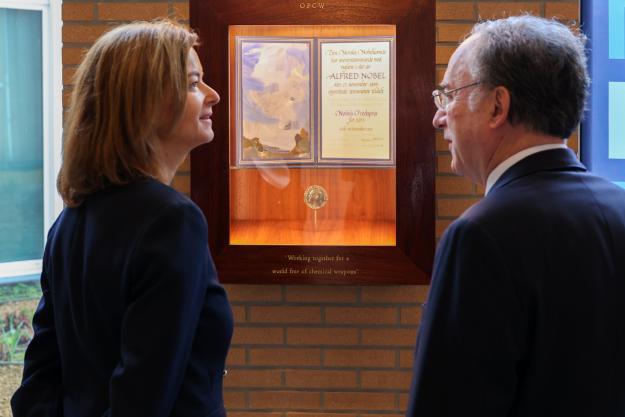
H.E. Ms Tanja Fajon, Minister of Foreign and European Affairs of the Republic of Slovenia, and Ambassador Fernando Arias, Director-General of the OPCW
THE HAGUE, Netherlands—16 February 2024—The Director-General of the Organisation for the Prohibition of Chemical Weapons (OPCW), Ambassador Fernando Arias, met with the Minister of Foreign and European Affairs of the Republic of Slovenia, H.E. Ms Tanja Fajon, on 15 February 2024 at the OPCW’s Headquarters in The Hague.
“I am delighted to visit the seat of the Organisation for the Prohibition of Chemical Weapons and to reaffirm Slovenia’s support for this organisation – winner of the Nobel Peace Prize – and its noble mission of a world free of chemical weapons. We will continue to advocate for the full implementation of the Chemical Weapons Convention, also in our capacity as a member of the UN Security Council,” Minister Fajon said.
During the meeting, the Minister and the Director-General discussed the current international security environment and its impact on the global disarmament and non-proliferation architecture and the implementation of the Chemical Weapons Convention. Director-General Arias emphasised the importance for the OPCW to remain at the forefront of scientific and technological developments to address the threat of chemical weapons use and highlighted the role of the OPCW Centre for Chemistry and Technology (the ChemTech Centre) in this endeavour.
“Significant progress in science and technology could bring advantages, such as enhanced verification techniques, they also present risks. Artificial Intelligence, for example, holds tremendous potential, including the ability to predict the development of new toxic chemicals and their production methods,” the Director-General said.
“In the wrong hands, Artificial Intelligence could be utilised to design, develop, and produce new chemical warfare agents. The OPCW monitors advances in science and technology relevant to the Convention and will keep Member States informed of any developments in this regard,” he added.
The Director-General briefed the Minister on OPCW’s current organisational priorities, underlining that preventing the re-emergence of chemical weapons, strengthening chemical safety and security in Member States, and achieving universality of the Convention remain top priorities for the Organisation. He also thanked Slovenia for their contribution to the ChemTech Centre.
Background
The Republic of Slovenia has been an active member of the OPCW since 1997. Since 2018 It has contributed €23,000 to the OPCW, including €10,000 towards the construction of the Centre for Chemistry and Technology (ChemTech Centre) and €10,000 towards the Trust Fund for Syria Missions.
The ChemTech Centre, which was inaugurated on 12 May 2023, enhances the OPCW’s ability to conduct chemical research and analysis. This significantly reinforces the Organisation’s verification regime and inspection capabilities of chemical industries around the world. In addition, an increasing number of capacity building activities are being delivered through the Centre, including chemical emergency response trainings and analytical skills development courses for experts from Member States.
As the implementing body for the Chemical Weapons Convention, the OPCW, with its 193 Member States, oversees the global endeavour to permanently eliminate chemical weapons. Since the Convention’s entry into force in 1997, it is the most successful disarmament treaty eliminating an entire class of weapons of mass destruction.
On 7 July 2023, the OPCW verified that all chemical weapons stockpiles declared by the 193 States Parties to the Chemical Weapons Convention since 1997 — totalling 72,304 metric tonnes of chemical agents — have been irreversibly destroyed under the OPCW’s strict verification regime.
For its extensive efforts in eliminating chemical weapons, the OPCW received the 2013 Nobel Peace Prize.
